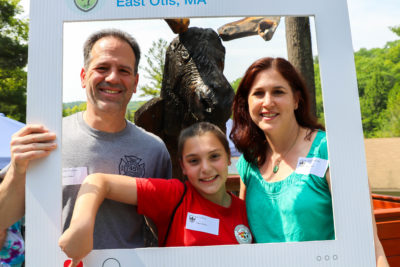Great Soccer Parenting: A Sweet Rejection
The media coverage on #youthsports and #soccerparenting is usually focused on adults behaving badly on the sidelines. Even though this is ultimately a story of a camper not returning to camp, it’s a brilliant example of youth soccer parenting I must share and celebrate.
The primary focus of my job is to educate parents and girls about the power behind a Berky experience. However, I couldn’t help but smile when I received the greatest rejection letter ever. The email below is from a parent of a camper that had attended Berky for the past 4 years, explaining why her daughter will not be returning to Berky this summer:
“Hi Eric- Thanks so much for your email. (CAMPER) is not planning to return to Berkshire this year – she LOVED it the past 4 years – but has been playing on the (SOCCER CLUB) DA team this year and is going to take a break this summer and a do a hiking trip in Northern California. We recommend Berkshire to all our local friends in (CAMPER CITY) – it was such a positive experience for her! Thanks again! ”
Lessons For Elite Soccer Parents: 5 Reasons Why Being Rejected Makes Us Proud and This Family Incredible
As one of the leaders in creating the Berkshire Soccer Academy and bringing our concept to life, I have spent many summers surrounded by young athletes trying to maneuver through the youth soccer system. It is not an easy task and the pressure put upon these players is real. Highlighted below are 5 lessons from the above email that are worth evaluating for parents of “elite” soccer players.
- Taking a break from soccer – This family is incredibly poised. They are not paralyzed by the fear of losing their daughter’s “spot” on a DA team. Beneath the family’s decision to take a break from soccer there MUST be a confidence that their families identify not dependent on the roster.

- Doing something different – What bravery! If taking a break is smart, engaging in a non-soccer activity is courageous. The #1 threat to a high performing young athlete is mental fatigue, burnout and the loss of joy from playing soccer. How do you preserve joy for the sport? The age old adage of “leave them wanting more” is aptly applied to youth sports. However, leaving is required in order to return. Unfortunately, early specialized athletes can defer from trying other activities.
- Taking a Step Back – This decision creates space for the family to re-evaluate things. It is a gift to return to the sport you love with a new plan and new goals set for the future. However, most athletes need a coach or parent to guide them to “step-back” and give attention to another activity.

- An Attitude of Gratitude – Being around people who give thanks frequently is empowering. It re-enforces a mindset of appreciation. Developing the skills to share in an appropriate tone is something every athlete should learn to do, and that’s a parents job.
- Building Bridges – Even though this camper is not returning to camp, the way in which they’ve declined, is still constructive. Our mutual standing creates the opportunity for this camper to return, to lean on Berky for a soccer reference and potentially as a future employer. In fact, one recent graduate of Georgetown’s women’s soccer team has written a book about the value of hiring athletes. Taylor Pak wrote the book Fit For Business: Why Your Next Employee Should be a Former College Athlete, where she uses her own experiences and scientific research to demonstrate that the College Athlete is more than capable of performing in the workplace.
Whether they are athletes, dancers, artists or musicians, the guidance that children receive while navigating through adolescence is crucial to their development. The pressure of being “elite” can come at a price. These 5 examples can serve as a blueprint for parents as they help their child develop as a “whole player” and reduce the occurence of burnout and fatigue. As Vince Lombardi once said:
“Fatigue makes cowards of us all!”
There is More to Camp than Soccer



